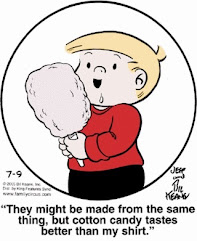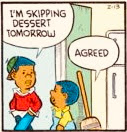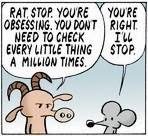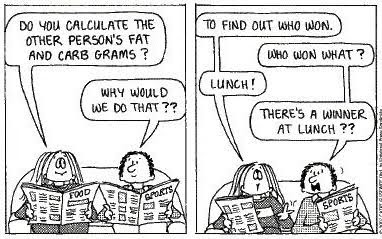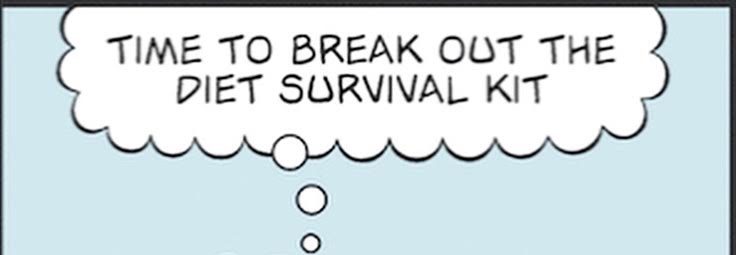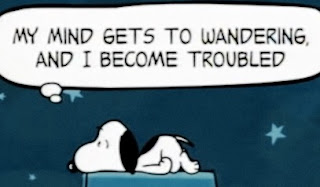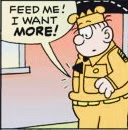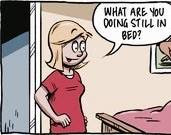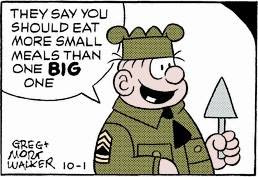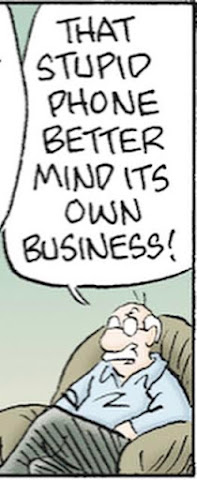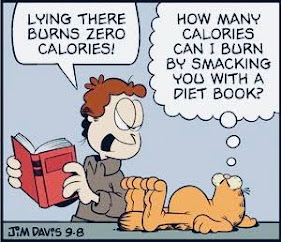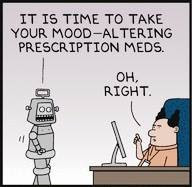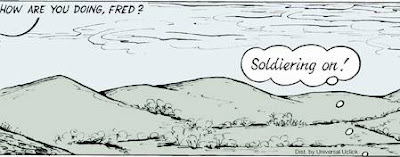"The best series wake us up; the worst are numbing agents."
So stated The New Yorker's television critic Emily Nussbaum early last year; that April, her column examined the legacy of Norman Lear's All In The Family and the reemergence of "agitating comedies." Whether on cable, basic network, or streaming channels, edgy themes have seized command -- pushing to the margins lighter fare in the last two years. Between Orange Is the New Black, The Unbreakable Kimmy Schmidt, Louis, Mom, Nurse Jackie, Married, Girls, black-ish, Crazy Ex-Girlfriend, Last Man on Earth, and just-released Master of None, we see, respectively (and in some cases collectively): dysfunction and corruption within America's correctional facilities and hospitals; brainwashing by evangelicals and cults; sexual violence; abduction; skewered female body image and with it gender disparity; race relations and identity; class elitism; alcoholism; parental malaise; marital dissatisfaction; fire arms misuse; human extinction; nervous breakdowns (with stifling OCD and without, not to mention occasional song-and-dance routines); cancer; mental/medical crises and addictions of various ilk. And this is only just within the sitcom landscape, speaking nothing of sketch shows airing on Comedy Central (crass, brassy Inside Amy Schumer, wickedly sardonic Key & Peele) or of that same channel's news parodies trading in what The Colbert Report dubbed "truthiness" (see: The Daily Show, Nathan For You). Then there are the limitless, open-format YouTube feeds of even greater genre ambiguity, as well as well-established viral-video generator Funny or Die -- known for quick-to-the-draw short-form videos enlisting high-profile celebrity casts and topical, buzz-worthy gags. Programs have entered such nebulous territory in recent seasons that they straddle categories; OItNB resists being defined as strictly "comedy" or "drama" and submits itself based on a quantifiable point that everyone can agree on: time. It's easier to measure technicalities (such as running length) than it is to count jokes, after all. Humor is less easily nailed-down, less identifiable. That's why at The 67th Emmys this September Orange was thrown together with "serious" shows like Homeland, Mad Men, Downton Abbey, House of Cards, and Game of Thrones, based almost entirely on its hour-long structure. Life, and with it its media mirror, is "a lot more nuanced than that" -- to borrow a defense from the titular Crazy Ex-Girlfiend, pitching her dilemma in one of many musical interludes.
You're the Worst, the latest comedy to adopt a saturnine sheen (albeit intermittent to ballsy. snide jocularity and sophomoric activities) is another will-they-or-won't-they young-adult romance dumped amidst your obscure cable fields. In the November 13 issue of Entertainment Weekly -- on newsstands -- a spotlight is awarded the executive producer and female lead by writer Danielle Nussbaum (not of relation to Emily). Even though it has built a reputation for raw, honest opinion and snide bravado, "fans were [nonetheless] shocked by its latest plot twist." Below, her featurette from page 18 titled, 'YOU'RE THE WORST' GETS REAL DARK --AND REAL GOOD:
You're The Worst, FXX's sleeper hit about four thirty somethings treading in a pool of ennui, has hijacked the zeitgeist with its poignant writing and appallingly likable characters. But beyond the coke binges, rap feuds, and Sunday Fundays, season 2 (airing Wednesdays at 10:30 p.m.) has started its biggest conversation yet by tackling the complicated subject of depression.
In the Oct. 21 episode, Gretchen (Aya Cash) admitted to her boyfriend, Jimmy (Chris Greene), that she suffers from clinical depression. It's not the first time a TV character has struggled with the illness, but the confession, from a foulmouthed partner with boundary issues, was surprisingly candid.
"When the word depression came up, it sounded exciting -- but also scary," says show creator Stephen Falk. "Would people stop watching and say, "I thought this was a comedy'? But for all the intentional silliness [on the show], I want these characters to feel real."
Falk is using the show's format as a storytelling tool. Each episode since the reveal has been an interpretation of Gretchen's coping mechanisms, from the cabin-fever setting of attempting to stymie a relapse to the horror house of someone trying to "fix" her. This week, Worst takes such a creative risk, you might think you're watching the wrong show. For the first six minutes, viewers are immersed in the lives of a hip Silver Lake couple, with dark a familiar You're the Worst character in sight. It's not until we get a glimpse of Gretchen in the background that we understand she's trying to feel normal by appropriating someone else's reality.
For her nuanced performance, Cash drew from real-world encounters. "It was completely in line with my own experiences of people who have clinical depression of which I've been around quite a few," she says. "We don't see the episodes before they air, so I watch with everyone else, and the response was so moving, it felt like we got this right."






























